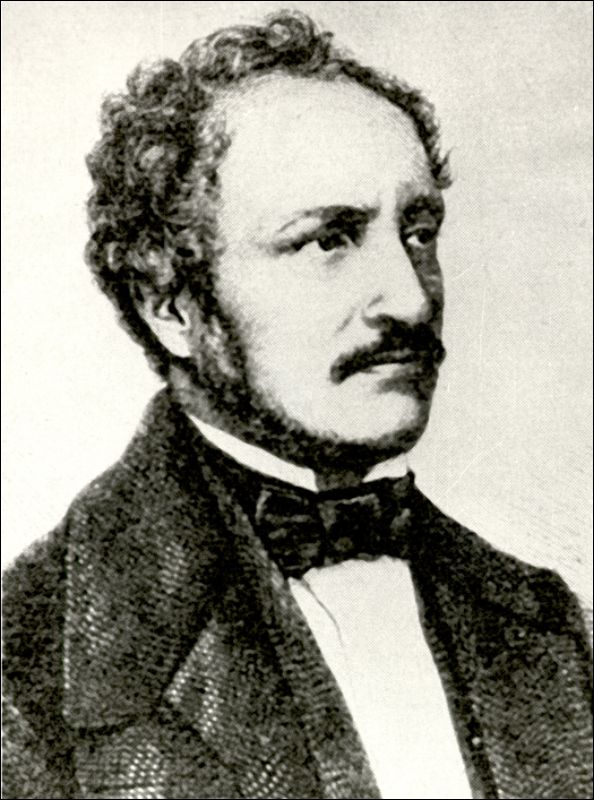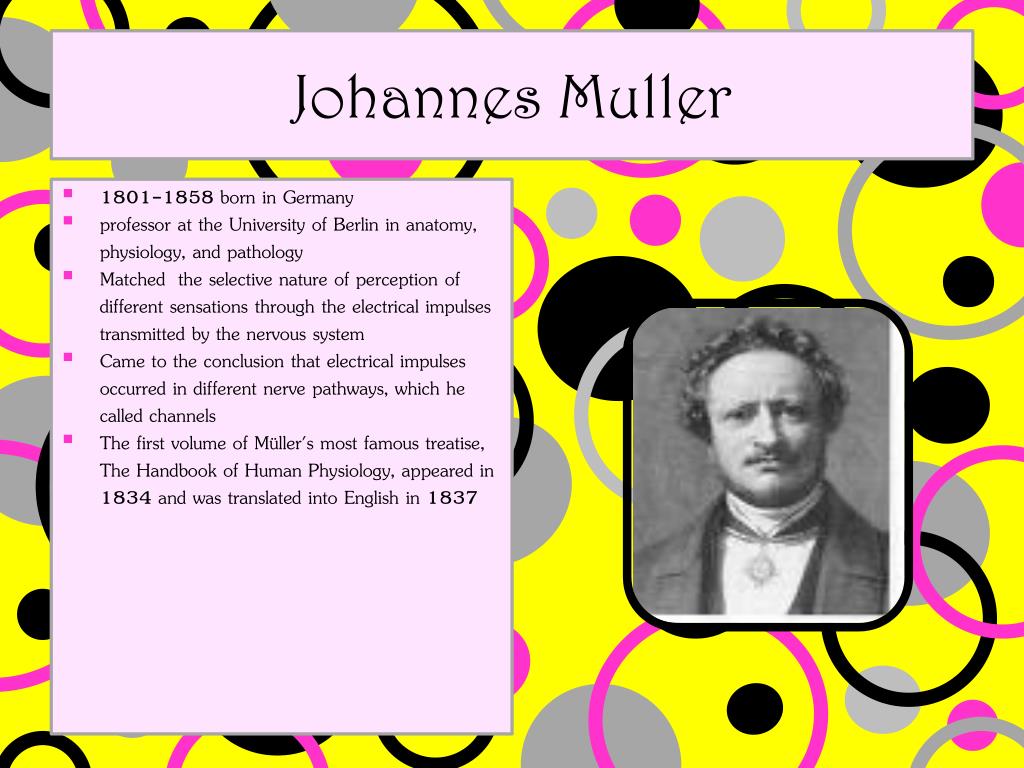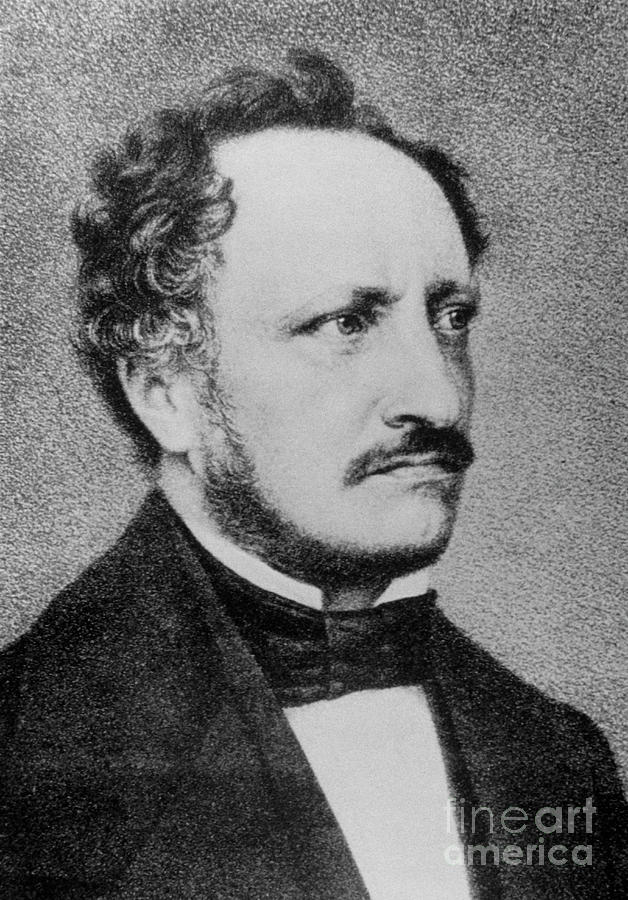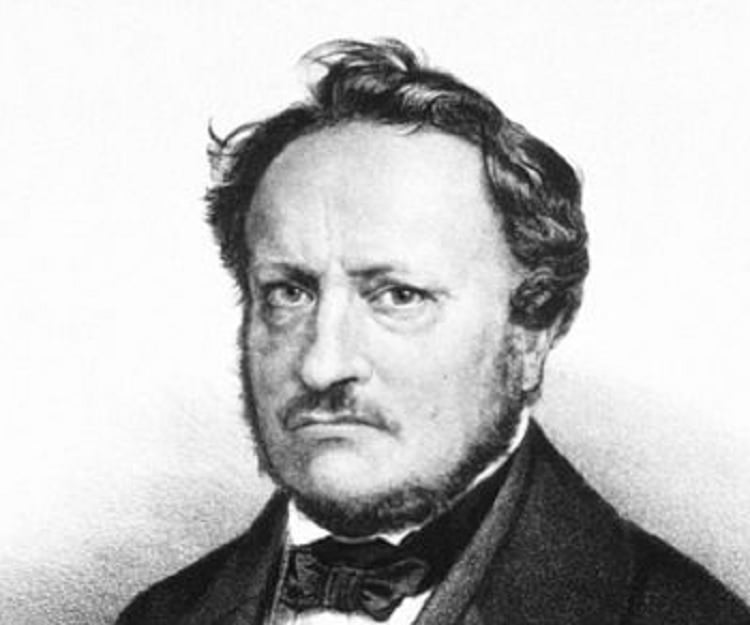
Johannes MÜLLER Psychotherapist Diplom Bundeswehrkrankenhaus
Johannes Müller, (born July 14, 1801, Koblenz, France [of the Consulate]—died April 28, 1858, Berlin, Germany), German physiologist and comparative anatomist, one of the great natural philosophers of the 19th century. His major work was Handbuch der Physiologie des Menschen für Vorlesungen, 2 vol. (1834-40; Elements of Physiology ).

PHYSIOLOGICAL PSYCHOLOGY CHAPTER 6!!! Johannes Muller Described the
Johannes Muller's law of specific nerve energies (LOSNE) states that the mind has access not to objects in the world but only to our nerves. This law implies that the contents of the mind have no qualities in common with environmental objects but serve only as arbitrary signs or markers of those objects. The present article traces the implications of LOSNE for non-physical theories of mind and.

Biografie, Johannes Müller
Johannes Müller's law of specific nerve energies (LOSNE) states that the mind has access not to objects in the world but only to our nerves. This law implies that the contents of the mind have no qualities in common with environmental objects but serve only as arbitrary signs or markers of those objects.

The History of Psychology and It’s Development feluthfiati
Between 1828 and 1838 Johannes Muller (1801-1858) published his important neurophysiological and anatomical investigations (primary fibres, cranial nerves, reflex movement, experimental proof of Charles Bell's law). Muller's strategies and concepts in neurophysiology can be used as an example for his scientific approach.

Johannes Müller (18011858), Profesor de Fisiología de las
died on April 28, 1858 in Berlin. Among numer-ous outstanding achievements during his career, he published several books including the eight books between 1833 and 1840 that comprised his Handbuch der Physiologie des Menchen. The Handbuch established Müller as the most renowned physiologist of his time.

Meet Johannes Muller All that matters is TheAdReview
The canonical early statement of the Doctrine by the physiologist Johannes Peter Müller had profound influence on both the philosophy and psychology of the 19 th and early 20 th centuries, especially as reformulated and transmitted by Müller's student Helmholtz.

PPT Scientists Time Line PowerPoint Presentation, free download ID
Johannes Peter Müller was born on July 14, 1801 in Coblenz, Germany, an ancient city in middle Germany. Some well-respected historians spell his surname "Mueller" (Young, 1990). Müller died on April 28, 1858 in Berlin. Among numerous outstanding achievements during his career, he published several books including

Johannes muller Fotos e Imágenes de stock Alamy
PSYCHOLOGY * Philosophical analysis of psychological concepts has led to some im-portant criticisms of theories of behavior developed by experimental. Johannes MUller was still a vitalist, but by 1845 the progress of physiology made it possible for some of his students,, including DuBois Reymond,

Johannes Peter Muller Photograph by Science Photo Library Pixels
Johannes Muller (1801-1858) is frequently referred to as the father of experimental physiology. While it might be argued that the title belongs more properly to Sir Charles Bell, the fact remains that during the first half of the nineteenth century Muller was the dominant figure in the rapidly developing science of physiology.

Johannes Müller (Physiologe) AnthroWiki
Physiological psychology is the study of how behavior and thought influence each other. It's a fascinating field that was first formally addressed in the 1800s, but its roots go back much, much.

Johannes MÜLLER Universität Witten/Herdecke, Witten Department of
Introduction Johannes Peter Müller, 1801-1858 Johannes Peter Müller was born on July 14, 1801 in Coblenz, Germany, an ancient city in middle Germany. Some well-respected historians spell his surname "Mueller" (Young 1990 ). Müller died on April 28, 1858 in Berlin.

Johannes Müller (Physiologe) AnthroWiki
Johannes Peter Müller (14 July 1801 - 28 April 1858) was a German physiologist, comparative anatomist, ichthyologist, and herpetologist, known not only for his discoveries but also for his ability to synthesize knowledge. The paramesonephric duct (Müllerian duct) was named in his honor. Life Early years and education Müller was born in Coblenz.

PPT The 19 th century PowerPoint Presentation, free download ID1090043
The great nineteenth-century physiologist Johannes Müller (1801-58) made important contributions in a range of subjects but especially in the study of the nervous system and in the psychology and physiology of perception.

PPT Chapter 1 The science of psychology PowerPoint Presentation
2. Johannes Müller (1801-1858) About Johannes Müller (brief) More about Johannes Müller Major point, of TREMENDOUS IMPORTANCE for psychology: Your awareness is not the object out there, it is of your nervous system. The nervous system is an intermediary between the object and your consciousness.

Johannes Peter Müller Biography Facts, Childhood, Family Life
Johannes Müller-Trede is Associate Professor of Managerial Decision Sciences. He holds a Ph.D. in Economics from Universitat Pompeu Fabra in Barcelona, and an MA (Mod) in Management Science and Information System Studies from Trinity College, Dublin. Before joining IESE, he spent several years as a post-doctoral researcher at UC San Diego's.

PHYSIOLOGICAL INFLUENCES ON PSYCHOLOGY CH 3 Lecture Prepared
They cajole, or ridicule, or ostracise the problem-maker, or they might try to leave him on his own. Some aggressors might respond by backing down and trying to mend their ways. Others, however.